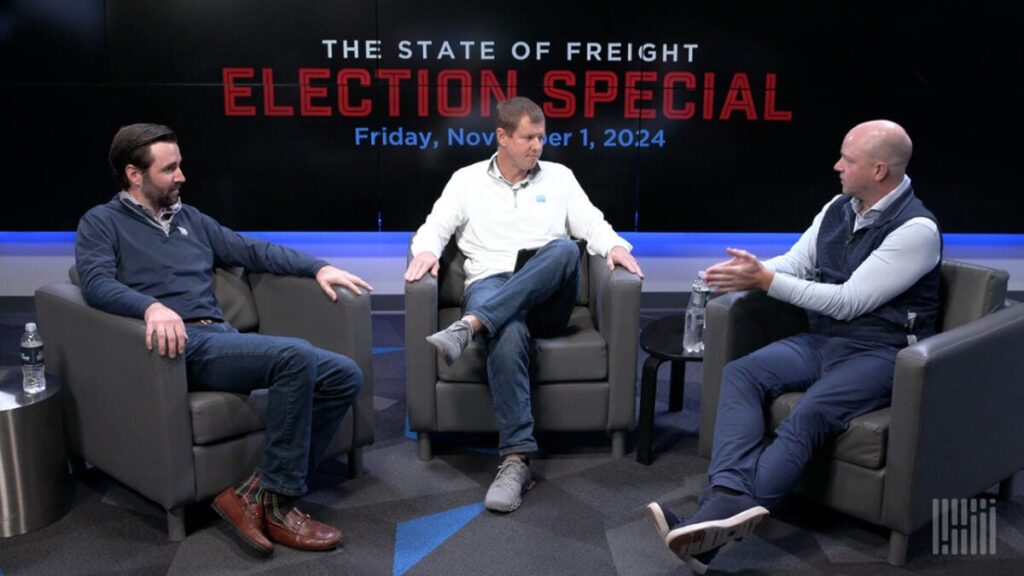FreightWaves SONAR hosted a significant webinar to analyze the potential repercussions of the upcoming U.S. presidential election on the commercial transportation sector. With the election between Democrat Kamala Harris and Republican Donald Trump just days away, the discussion led by FreightWaves SONAR CEO Craig Fuller and Senior Analyst Tony Mulvey focused on how policies from either candidate could impact the freight market. The insights shed light on critical areas such as labor, tax policies, tariffs on imports, and the overarching economic conditions shaped by federal governance. With approximately 32% of the U.S. economy reliant on logistics-dependent industries, the ramifications of these policies could be profound.
Fuller elaborated on the diverse ways federal policies can shape the freight industry, emphasizing the interconnectedness of transportation and the broader economy. He highlighted that government policies on labor, taxes, and tariffs directly affect logistics businesses. For instance, potential tax changes could drive demand in manufacturing and consumer sectors, while labor policies, with particular reference to issues like port strikes, hold significant implications. Additionally, tariffs on foreign goods stand out as a double-edged sword; while they might stimulate domestic manufacturing, they also risk escalating prices for consumers and diminishing profit margins for companies reliant on imports.
Analyzing candidate-specific policies, Trump’s potential reelection could be marked by aggressive import taxation strategies, including proposed 60% tariffs on Chinese goods. Fuller pointed towards historical precedents during Trump’s initial term, where tariffs did not immediately lead to inflation yet significantly influenced trade dynamics with China. He observed that increased tariffs could constrain Chinese exports, compelling price reductions essential for remaining competitive. With hints at a precarious economic landscape for China, especially amid concerns of overcapacity, these scenarios painted a complex picture of U.S. trade relations based on tariff adjustments.
On energy policy, both candidates advocate for enhanced U.S. energy production, albeit via different strategies. Harris is vocal about integrating climate change considerations and advancing cleaner energy technologies, whereas Trump aims to retract regulations that inhibit traditional oil and gas drilling. Fuller argued that deregulating energy extraction could enhance domestic economic conditions and lower costs for consumers by tapping into the natural resource wealth of the country. He posited that reducing restrictions could create a more self-sufficient energy landscape in the U.S., thus keeping economic benefits within the nation rather than relying on imports.
A pivotal concern discussed was the future of electric vehicles and how energy policies could orient the U.S. economy in a global context, particularly concerning competition with China. Fuller expressed reservations regarding a transition to electric vehicles without maintaining a robust fossil fuel sector. He highlighted that while electric vehicle manufacturing is growing, the U.S. holds significant advantages in traditional automotive technology, and surrendering this lead could yield severe competitive disadvantages against nations like China, which is rapidly advancing in electric vehicle production.
Lastly, Mulvey touched upon the broader implications of U.S. foreign spending, particularly in light of aid to Ukraine against Russia. This aspect of U.S. fiscal prioritization could resonate with voters considering the domestic economic climate. He noted that the significant financial aid flowing to international entities can overshadow domestic issues that equally warrant attention. The analysis of these foreign expenditures indicates a bifurcation in how economic resources are allocated, which could ultimately influence voter sentiment and perceptions of each candidate’s ability to govern effectively concerning not just freight but the wider economy and global standing of the United States.
In conclusion, the FreightWaves SONAR discussion underscored that the outcome of the U.S. presidential election could lead to significant shifts within the freight industry, influenced by various policies from either candidate concerning tariffs, labor, energy, and global economic engagement. The interconnected nature of these topics indicates an intricate web of consequences for businesses, consumers, and the overall health of the economy, reinforcing the importance of understanding the nuances of each candidate’s platforms as voters make their decisions.

